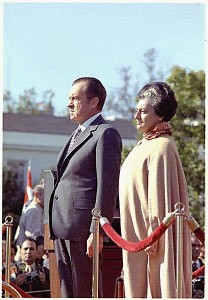
Nixon and Gandhi, together in 1971, despised one another. He referred to her behind the scenes as an “old witch.”
I brought you an excerpt of Oriana Fallaci’s spellbinding 1972 session with Henry Kissinger from the journalist’s great out-of-print book, Interview with History. I’m returning for passage of Fallaci’s 1972 Q&A with Indira Gandhi, one of the most complex and thorniest political leaders of that era.
By the time Fallaci had published her book in 1976, she had renounced her admiration for Gandhi, who had been India’s tough-as-nails Prime Minister and a feminist icon. In 1975, Gandhi, rather than resign as Prime Minister after being convicted of election fraud, declared the Indian version of martial law, had her political opponents imprisoned and repealed many of the citizens’ freedoms. She had, in effect, become a dictator.
Fallaci wrote a new introduction to the four-year-old interview that expressed bitter disappointment in the fallen idol. (“I didn’t hide my regret and shame at having portrayed her in the past as a woman to love and respect.”) Here’s a portentous excerpt from the interview that was conducted in New Delhi:
Oriana Fallaci:
Mrs. Gandhi, I have so many questions to ask you, both personal and political. The personal ones, however, I’ll leave for later–once I’ve understood why many people are afraid of you and call you cold, indeed icy, hard…
Indira Gandhi:
They say that because I’m sincere. Even too sincere. And because I don’t waste time with flowery small talk, as people do in India, where the first half hour is spent in compliments: ‘How are you, how are your children, how are your grandchildren and so forth.’ I refuse to indulge in small talk. And compliments, if at all, I save for after the job is done. But in India people can’t stomach this attitude of mine, and when I say, ‘Hurry up, let’s get to the point,’ they feel hurt. And think I’m cold, indeed, icy, hard. Then there’s another reason, one that goes with my frankness: I don’t put on an act. I don’t know how to put on an act; I always show myself for what I am, in whatever mood I’m in. If I’m happy, I look happy; if I’m angry, I show it. Without worrying about how others may react. When one has had a life as difficult as mine, one doesn’t worry about how others will react.•
